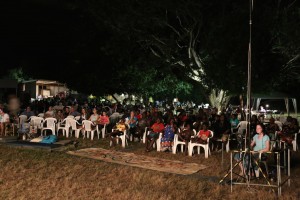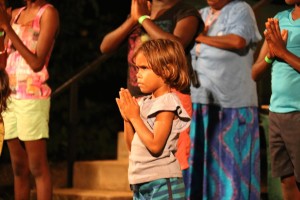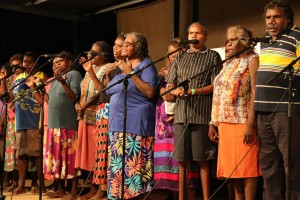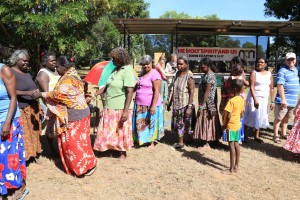
At this year’s Katherine Christian Convention. Photo courtesy of Nungalinya College.
One thousand Aboriginal Christians in outback Australia depend on it for spiritual nourishment, but after almost 50 years the Katherine Christian Convention is in danger of closing.
Organisers say the convention will not be able to continue in its current form in 2015 due to a lack of younger volunteers needed for the annual gathering on the banks of the Katherine River.
Workers are required to prepare sanitation, water and kitchen facilities at the campsite for the influx of over 1000 Indigenous people from across the Northern Territory.
Bruce and Jane Morrow, who have donated the use of their farm as the convention site for over 20 years, need to pass the baton.

Photo courtesy of Nungalinya College.
“I’m nearly 80 and I’m mentally and physically not able to run it as I have for the last 30 years,” Bruce Morrow says.
Mr Morrow says the convention facilities, such as the kitchen and toilets, meet safety standards but are ageing and need to be updated. This requires a commitment from a group willing to take the project on in the long term.
“I want to see consistency,” he says. “There has to be some commitment by a structured organisation that’s stood the test of time.”
The convention is held in the first week of May at the start of the Top End’s dry season. This year’s conference saw 1115 people attend, of whom about 80 per cent were Aboriginal. Approximately 40 non-believers came forward over the course of the convention to publicly acknowledge their new-found faith in Christ.
The two speakers were Pastor Jerry Jangala OAM, an Aboriginal elder from Lajamanu on the edge of the Tanami desert who speaks Walpiri, and Bill Morrison, a cross-cultural worker with Baptist agency Global Interactions who trains and disciples Aboriginal church leaders.
The conference had a relaxed atmosphere and a sense of togetherness among people from different locations, convention chairman the Rev Tavis Beer says.
“There were no instances of fighting and people behaved really well – that’s one of the marks of being Christian.”
Mr Beer, a Katherine-based minister with CMS (Church Missionary Society), accepts that it is hard to get the help needed to run the operation.
“We have reached a point where we really need to talk about where to go from now,” he says, “it’s possible we might not be able to meet at the Morrow’s farm next year.”
The convention is a highlight on the calendar for Aboriginal Christians who live in remote communities and otherwise have no contact with other churches or access to Christian conventions. Many drive or fly hundreds of kilometres to attend.

Photo courtesy of Nungalinya College.
The convention’s master of ceremonies, Nungalinya College development officer the Rev Phil Zamagias, says he saw the greatest level of Indigenous participation in the program this year since the start of his involvement in 1990.
“It has been great to see Aboriginal students leading in prayer and opening sessions. Overall there was a very large proportion of Aboriginal participation,” he says. “There has been a conscious decision by the committee to try and build good relationships with the Aboriginal leaders.”
Mr Zamagias says the convention is a comfortable, safe and affordable place for Aboriginal people to be active in Christian ministry and read the Bible together in their own languages.
“You can see people enlivened, blessed and refreshed and ready to go back to their communities to share what they’ve learnt. It’s really a spiritually refreshing time for people who otherwise don’t have access to conferences.”
However, he says the heavy lifting involved in the preparation for the conference can no longer be left to older men such as Bruce Morrow and fellow organiser Jim Mathieson.
“It needs to be reinvented, revitalised and be culturally appropriate,” Mr Zamagias says.
“Money is not the issue, it’s the workers that are needed to make sure the grass is mowed and the toilets are clean. Just providing sanitation and water is a big job.”
Getting the campsite up to scratch will have a long-term impact on outback Aboriginal communities.

Photo courtesy of Nungalinya College.
Mr Morrow says the convention is so valuable because it brings together different Christians from different denominations and different cultural and social backgrounds. Over decades of meeting together, he says Aboriginal Christians with divergent social and cultural practices have developed a spirit of tolerance, consideration and acceptance of each other.
“They can see they look very different and they do things differently but they have the same goal – all one in Christ.”
Email This Story
Why not send this to a friend?
